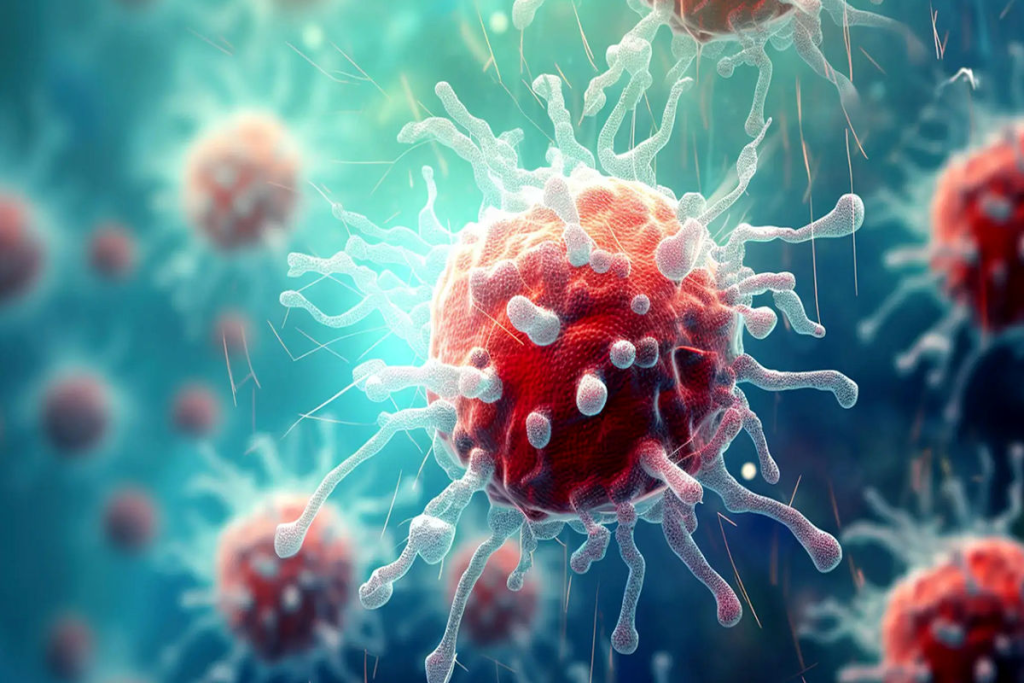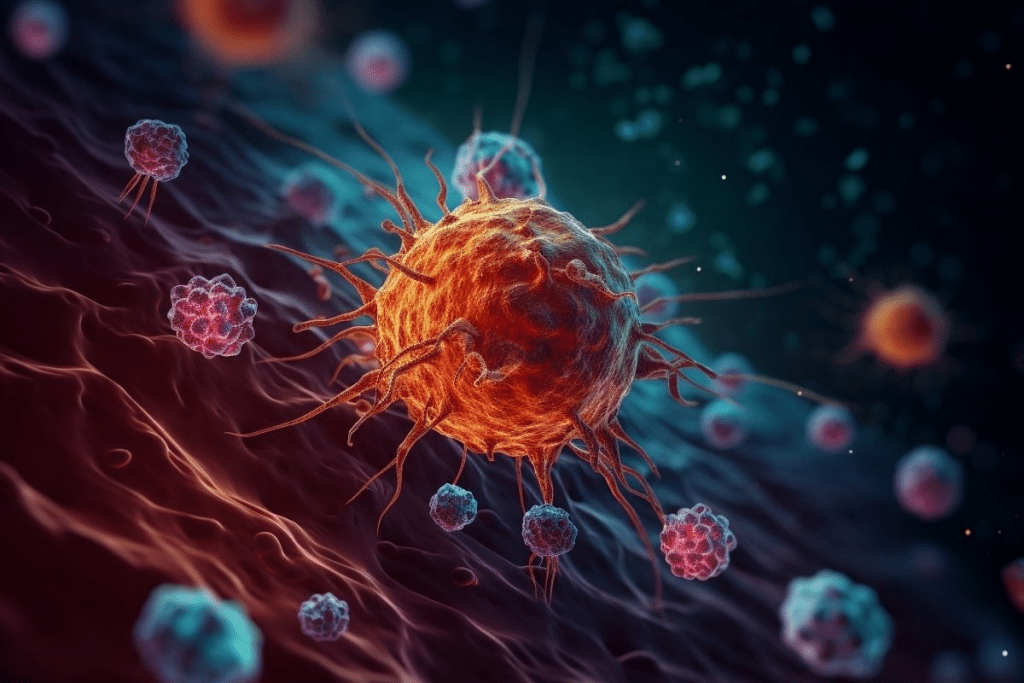We detail the risks of over-stimulation. Learn about the rare but serious side effects where immunotherapy treatment can potentially cause adverse effects.
Immunotherapy has changed cancer treatment, giving hope to patients everywhere. But, it can also cause severe or lasting harm. We look at the balance between its benefits and risks.

Studies show up to 90% of patients on immunotherapy face side effects, with many being serious. A study on the National Center for Biotechnology Information highlights the high rate of immune-related side effects.
Key Takeaways
- Immunotherapy can cause severe side effects in a significant portion of patients.
- Careful patient selection and monitoring are key to reducing risks.
- The benefits of immunotherapy must be weighed against its risks.
- Research is ongoing to understand and lessen the adverse effects of immunotherapy.
- Immunotherapy has transformed cancer care, bringing new hope to patients.
What Is Immunotherapy and How It Works
Immunotherapy is a new way to fight cancer by boosting the body’s defenses. It’s also known as immune therapy. It uses the body’s immune system to find and kill cancer cells.
Immunotherapy helps the immune system fight cancer better. It’s different from old treatments that directly attack cancer. Instead, it makes the immune system stronger to fight cancer cells.

The Science Behind Harnessing the Immune System
The immune system keeps us safe from infections and diseases. It has many parts working together to protect us. When we get cancer, our immune system might not work as well. Immunotherapy tries to fix this.
Immunotherapy works by focusing on specific proteins on cancer cells or immune cells. For example, immune checkpoint inhibitors block proteins that stop the immune system from fighting cancer cells.
Types of Immunotherapy Approaches
There are many ways to use immunotherapy, each working differently. Here are some common ones:
- Adoptive Cell Therapy: This method takes immune cells from the body, changes them to fight cancer, and puts them back in.
- Monoclonal Antibodies: These are special antibodies made in the lab. They target proteins on cancer cells, helping the immune system destroy them.
- Cancer Vaccines: These vaccines help the immune system see and attack cancer cells.
- Immune Checkpoint Inhibitors: These drugs stop proteins that hold back the immune system. This lets the immune system fight cancer cells better.
Knowing about these immunotherapy types helps patients and doctors choose the best treatment.
The Revolutionary Impact of Immunotherapy in Cancer Treatment
Immunotherapy has changed how we treat cancer. It uses the body’s immune system to fight cancer. This new method has shown great promise in treating cancers like melanoma, lung, and kidney cancer.
Success Stories and Breakthrough Cases
Immunotherapy has led to many success stories in cancer treatment. For example, checkpoint inhibitors have changed the game for advanced melanoma. Some patients have even seen their cancer disappear completely.
These breakthroughs have given new hope to many. They have shown that even cancers once thought untreatable can now be fought effectively.
Some notable success stories include:
- Patients with advanced melanoma experiencing complete remission after treatment with checkpoint inhibitors.
- Significant tumor reduction in lung cancer patients treated with immunotherapy.
- Improved survival rates in kidney cancer patients receiving immunotherapy.

Cancer Types Most Responsive to Immunotherapy
Immunotherapy has shown great promise in treating many cancers. But some cancers respond better than others. These include:
- Melanoma: Immunotherapy has significantly improved survival rates and treatment outcomes.
- Lung Cancer: Particular types, like non-small cell lung cancer (NSCLC), have shown positive responses to immunotherapy.
- Kidney Cancer: Certain types of kidney cancer have benefited from immunotherapy.
- Bladder Cancer: Immunotherapy has emerged as a viable treatment option for advanced bladder cancer.
Immunotherapy vs. Chemotherapy: Key Differences
Immunotherapy and chemotherapy are two different ways to fight cancer. Chemotherapy targets cancer cells directly. Immunotherapy, on the other hand, empowers the immune system to attack cancer cells.
This difference leads to several advantages. Immunotherapy often has fewer side effects. It also leads to more lasting results.
| Treatment Aspect | Immunotherapy | Chemotherapy |
| Mechanism of Action | Stimulates the immune system to fight cancer | Directly targets and kills rapidly dividing cells |
| Side Effects | Generally fewer side effects, but can include immune-related adverse events | Can cause significant side effects due to its cytotoxic nature |
| Response Duration | Can lead to more durable responses | Responses may be shorter-lived |
Can Immunotherapy Cure Stage4 Cancer?
Immunotherapy is a new hope for stage 4 cancer patients. It uses the body’s immune system to fight cancer. This method is more targeted and effective than traditional treatments.
Success Rates in Advanced Metastatic Disease
Immunotherapy’s success in stage 4 cancer depends on several factors. These include the cancer type, the patient’s health, and the treatment used. Some patients have seen big tumor reductions and better survival rates.
Research shows that some stage 4 cancers respond better to immunotherapy. For example, melanoma and lung cancer have higher response rates than others.
Notable Case Studies and Clinical Trial Results
Many case studies and clinical trials highlight immunotherapy’s promise. Checkpoint inhibitors have been very promising in treating advanced cancers. Some patients have even achieved complete remission.
Clinical trials are key in understanding immunotherapy’s effectiveness and safety. They help find the best treatment strategies and identify who will benefit most.
Realistic Expectations for Late-Stage Cancer Patients
Immunotherapy has shown great promise, but it’s important to have realistic expectations. It’s not a cure for everyone, and results can vary greatly.
Patients should talk to their doctors about their treatment options. Knowing the benefits and risks of immunotherapy helps patients make informed decisions.
The Prevalence of Immunotherapy Side Effects
Immunotherapy is becoming more common as a cancer treatment. It’s important for patients and doctors to know about its side effects. While it offers hope for many, it also comes with risks.
Up to 90% of Patients Experience Some Form of Side Effect
Studies show that up to 90% of people on immunotherapy face side effects. These can be mild or severe, even life-threatening. This highlights the need for close monitoring and management.
Side effects like fatigue, rashes, and organ inflammation are common. Fatigue can really affect a person’s life, while rashes and organ inflammation can be serious if not treated right.
Common Immune-Related Adverse Events (irAEs)
irAEs are a big worry with immunotherapy. About 40% of patients get irAEs, which can harm different parts of the body. Common ones include:
- Colitis (inflammation of the colon)
- Pneumonitis (inflammation of the lungs)
- Hepatitis (inflammation of the liver)
- Thyroiditis (inflammation of the thyroid gland)
Spotting irAEs early is key to managing them and avoiding long-term damage.
Recognizing Signs Immunotherapy Is Working vs. Causing Harm
Telling if immunotherapy is working or causing harm can be tricky. When it’s working, patients might see:
- Reduced tumor size
- Improved overall health
- Increased energy levels
But harmful side effects can show up as severe fatigue, constant pain, or big changes in organ function. It’s vital for patients and doctors to keep a close eye on how the treatment is going and deal with any bad effects fast.
Knowing about immunotherapy’s side effects and the signs of its success or harm helps everyone involved make better choices about treatment.
Severe Complications: When Immunotherapy Does More Harm Than Good
Immunotherapy is becoming more common in cancer treatment. It uses the body’s immune system to fight cancer. But, it can also cause serious side effects.
Grade 3-5 Side Effects Affecting 50% of Patients
About 50% of patients on immunotherapy face severe side effects. These can include extreme tiredness, diarrhea, colitis, and lung problems. These issues can be very serious and even life-threatening.
Doctors need to watch patients closely and find ways to manage these side effects. They must weigh the benefits of treatment against the risks. This helps tailor treatment to each patient’s needs.
Life-Threatening Complications and Their Frequency
Though rare, serious complications can happen with immunotherapy. These include heart problems, brain inflammation, and severe allergic reactions. These risks are low but can have a big impact on patients.
Doctors are studying what causes these serious problems. They want to find ways to predict who might be at risk. This could lead to safer treatments for everyone.
Organ-Specific Toxicities and Their Management
Immunotherapy can harm different parts of the body. For example, it can cause problems in the gut or lungs. Managing these issues requires a team of specialists.
Doctors use early treatment and sometimes stop the therapy. Teaching patients about these risks is also key. This helps them know when to seek help.
Long-Term Toxicities of Immunotherapy Treatment
Immunotherapy’s long-term effects are growing more important as more people get treated. We’re learning how to use the immune system to fight cancer. But, we must also understand the long-term side effects that can change patients’ lives.
Thyroid, Pancreatic, and Joint Issues Requiring Lifelong Management
Immunotherapy can cause endocrine disorders like thyroid problems, pancreatic issues, and joint problems. These conditions need lifelong care and can really affect a patient’s life. For example, thyroid issues can cause hypothyroidism or hyperthyroidism, needing ongoing medication and checks.
| Endocrine Disorder | Symptoms | Management |
| Thyroid Dysfunction | Fatigue, Weight Changes | Thyroid Hormone Replacement |
| Pancreatic Issues | Diabetes, Pancreatitis | Insulin Therapy, Pain Management |
| Joint Problems | Pain, Stiffness | Physical Therapy, Anti-inflammatory Medications |
Rheumatological Side Effects in 20-25% of Patients
Rheumatological side effects are a big worry for those on immunotherapy. These can show up as arthritis, myositis, or other inflammatory diseases, hitting up to 25% of patients. Handling these side effects needs a team effort, including rheumatologists and other experts.
Quality of Life Impact from Persistent Immunotherapy Toxicities
The lasting toxicities from immunotherapy can deeply affect a patient’s life quality. Chronic issues like thyroid problems or joint pain can mess with daily life, mental health, and overall happiness. It’s key for healthcare teams to keep a close eye on these effects and find ways to lessen their impact.
Dealing with immunotherapy’s long-term side effects is tough. Our healthcare team is dedicated to giving full support to manage these effects and boost patients’ life quality.
Risk Factors for Adverse Reactions to Immunotherapy
Immunotherapy is a game-changer in cancer treatment but comes with risks. It’s important to know and manage these risks. Understanding who is more likely to have bad reactions is key.
Patient Factors That Increase Vulnerability
Some patient factors can raise the risk of bad reactions to immunotherapy. Age is one; older patients might have weaker immune systems. Also, those with autoimmune diseases are more likely to face immune-related adverse events (irAEs).
Another important factor is the patient’s health before starting treatment. Patients who are not very healthy might face more severe side effects.
Pre-Existing Conditions and Their Impact
Pre-existing medical conditions can also affect how well a patient does with immunotherapy. For example, those with lung problems might be more at risk for lung inflammation.
Patients with heart diseases could also face more heart-related side effects. Knowing these risks helps doctors keep a closer eye on patients and treat side effects quickly.
Genetic Factors in Immunotherapy Response
Genetics can also play a role in how well a patient responds to immunotherapy. Genetic variations can change how the drug works and how it affects the body.
Scientists are working on finding biomarkers to predict how a patient will react. This could help make treatments safer and more effective for each person.
Advanced Hospital Protocols for Managing Immunotherapy Risks
Hospitals are now using advanced protocols to handle the risks of cancer immunotherapy. This is because immunotherapy is changing how we treat cancer. It’s clear we need better ways to manage it.
Multi-Disciplinary Monitoring Systems
Top hospitals are setting up teams to watch over patients getting immunotherapy. These teams include doctors, radiologists, and nurses. They work together to keep an eye on how patients are doing and any side effects.
- Regular check-ups and assessments to identify early signs of complications
- Advanced imaging techniques to monitor tumor response and detect possible issues
- Coordination between different departments to ensure complete care
How Leading Hospital Networks Improve Patient Safety
Hospital networks are working hard to make immunotherapy safer for patients. They’re doing this by:
- Creating standard ways to give and check on immunotherapy
- Teaching healthcare staff about the latest in immunotherapy and side effects
- Helping patients learn about their treatment and symptoms
These efforts help reduce the risks of immunotherapy and make sure patients get better.
Ethical and Innovative Approaches to Immunotherapy Management
Hospitals are also looking into new and fair ways to manage immunotherapy. They’re using new tech like AI and machine learning. This helps predict how patients will do and spot problems early.
Innovative practices include:
- Creating treatment plans that fit each patient’s genetic makeup and biomarkers
- Adding other therapies to help with side effects and improve life quality
- Joining clinical trials to keep up with the latest in immunotherapy research
By trying these new methods, hospitals can give patients the best care possible during immunotherapy.
Conclusion: Making Informed Decisions About Immunotherapy
Immunotherapy has changed cancer care a lot. It has shown great promise in fighting different cancers. But, it’s important to know the risks and side effects it can have.
People thinking about immunotherapy need to talk a lot with their doctors. Knowing the good and bad sides helps them make smart choices about their treatment.
The success of immunotherapy depends on choosing the right patients and managing side effects well. As research gets better, we’ll see even more benefits for those getting this treatment.
By staying up to date and working with their doctors, patients can get the most out of immunotherapy. This way, they can achieve the best results possible.
FAQ
What is immunotherapy, and how does it work?
Immunotherapy is a treatment that uses the body’s immune system to fight cancer. It makes the immune system attack cancer cells. This is done through different methods like checkpoint inhibitors and cancer vaccines.
What are the different types of immunotherapy approaches?
Immunotherapy has several types. These include checkpoint inhibitors, cancer vaccines, and adoptive T-cell therapy. Each method helps the immune system fight cancer in its own way.
Can immunotherapy cure stage 4 cancer?
Immunotherapy is promising for treating advanced cancer. But, whether it can cure stage 4 cancer depends on many factors. These include the cancer type, disease extent, and the patient’s health. Some stage 4 cancer patients have seen complete remission with immunotherapy. But, it’s important to have realistic expectations and talk to a healthcare provider.
What are the common side effects of immunotherapy?
Side effects of immunotherapy include fatigue, skin rash, and diarrhea. Some people may also experience nausea. Immune-related adverse events (irAEs) can affect organs like the skin, liver, and lungs. It’s vital to watch for severe side effects and seek help early.
How do I know if immunotherapy is working?
If immunotherapy is working, you might see tumor shrinkage and improved symptoms. It’s also important to feel better overall. But, it’s key to watch for side effects and talk to your doctor about them. Some side effects can mean the treatment is working or if there’s a problem.
What are the risk factors for adverse reactions to immunotherapy?
Certain factors can increase the risk of side effects from immunotherapy. These include pre-existing medical conditions and genetic factors. Knowing these risks helps doctors manage and reduce side effects.
How do leading hospital networks manage immunotherapy risks?
Top hospital networks use several strategies to manage immunotherapy risks. They have systems for monitoring, innovative care approaches, and support services. These efforts help keep patients safe and improve their outcomes.
What are the long-term toxicities associated with immunotherapy?
Long-term side effects of immunotherapy can include thyroid, pancreatic, and joint problems. These can also affect the immune system. Managing these effects is important to improve quality of life.
How does immunotherapy compare to chemotherapy?
Immunotherapy and chemotherapy treat cancer differently. Immunotherapy uses the immune system to fight cancer, while chemotherapy kills cancer cells with chemicals. Immunotherapy might offer more targeted and less toxic options for some patients.
What are the signs that immunotherapy is causing more harm than good?
Signs of harm from immunotherapy include severe side effects and life-threatening complications. If you’re experiencing these, seek medical help right away. Persistent organ-specific toxicities are also a concern.
References
- Puzanov, I., Diab, A., Abdallah, K., Bingham, C. O., Brogdon, C., Dadu, R., … & Lipson, E. J. (2017). Managing toxicities associated with immune checkpoint inhibitors: consensus recommendations from the Society for Immunotherapy of Cancer (SITC) Toxicity Management Working Group. Journal for ImmunoTherapy of Cancer, 5(1), 95.https://jitc.bmj.com/content/5/1/95
- Schneider, B. J., Naidoo, J., Santomasso, B. D., Lacchetti, C., Adkins, S., Anadkat, M., … & Baxi, S. S. (2021). Management of Immune-Related Adverse Events in Patients Treated with Immune Checkpoint Inhibitor Therapy: ASCO Guidance. Journal of Clinical Oncology, 39(36), 3978-4014.https://ascopubs.org/doi/10.1200/JCO.21.01440
- Florou, V., Mamdani, H., Byrne, K., & Argiris, A. (2021). Considerations for immunotherapy in patients with cancer and preexisting autoimmune disease. Annals of Translational Medicine, 9(15), 1297.https://atm.amegroups.org/article/view/56690/html
- Brahmer, J. R., Lacchetti, C., Schneider, B. J., Atkins, M. B., Brassil, K. J., Caterino, J. M., … & Johnson, D. B. (2018). Management of immune-related adverse events in patients treated with immune checkpoint inhibitor therapy: American Society of Clinical Oncology clinical practice guideline. Journal of Clinical Oncology, 36(17), 1714-1768.https://ascopubs.org/doi/10.1200/JCO.2017.77.6385



































